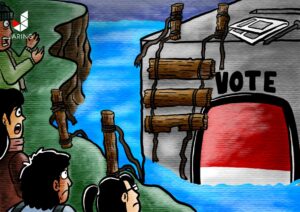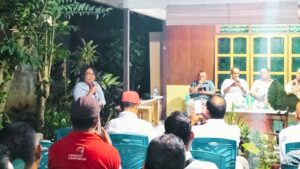Two years before the 2024 election, there are at least 75 political parties registered with the Ministry of Law and Human Rights (Kemenkumham). However, only six parties have completed data and documents in the Political Party Information System (Sipol) of the General Election Commission as of Thursday, July 28, 2022. Some of them also seem to have started preparing to win public sympathy. One of them is by utilizing social media, such as Tiktok.
Of the 19 parties that have TikTok accounts, five of them have followers over 10,000 and are fairly active in uploading content.
The Garuda Party is recorded to have the least number of content with the highest number of followers, reaching 450.7 thousand followers, followed by PKS with 31.8 thousand, the Indonesian Solidarity Party (PSI) with 16.6 thousand, the Ummat Party with 16.4 thousand, the National Mandate Party (PAN) with 15.8 thousand, and the last is the Regional Executive Board (DPD) for the National Democratic Party (Nasdem) of Bandung City is 14.7 thousand.
The content of the party’s Tiktok page is the same as most people’s. It contains short videos featuring several people dancing, parody videos, and other entertaining videos. Not infrequently, the content also presents personal activities and party agendas. Ahmad Syaikhu is one of them. The member of the House of Representatives of the Republic of Indonesia (DPR RI), who is also the General Chair of the PKS actively uploads his activities through the syaikhu_ahmad_ account. On July 2, Syaikhu shared a video when he was with his wife, ahead of the Eid al-Adha celebration.
Meanwhile, the video related to PKS that went viral was a video showing five women with the typical attributes of the Prosperous Justice Party (PKS) dancing on the side of the road. The eighteen-second video was watched 1.9 million times. It earned around 56.8 thousand likes, and garnered 6,574 comments.
On another account, nasdem.bdg belonging to the Bandung City’s regional executive board of Nasdem Party, for example, often uploads videos that invite netizens to participate in the party’s activities. The video uploaded last Tuesday, July 26, was one of the examples. The content shows the figure of a young woman in a party jacket. She poses by raising his arms above his head before pressing his palms together. With the help of a TikTok filter, the woman’s body seemed to move snaking to the rhythm of the music.
Another video shows rows of women wearing shirts, long pants, and some wearing short or long skirts warming up as if they were going to exercise. The 13-second video was captioned, “who says women are only a complement to politics.”
Of the one hundred content uploaded by Nasdem Bandung since June 19, 2022, there are at least 21 content that involves women. The majority of the content contains a brief description of strengthening the position of women in the political arena, but in fact, almost all of them merely show women’s faces and bodies.
Deputy Head of Media and Communication of the Bandung City’s regional executive board of Nasdem, Rhyma Permatasari, denied objectifying women in the party’s TikTok video. According to him, the videos that have been uploaded so far are not just dancing. Nasdem Bandung tries to invite young people to no longer be apathetic towards politics. Some of the content is also considered as a representation of women in politics.
“So these women are actively brought in and empowered for Nasdem Bandung itself. All the women in the content are all cadres. So they also happen to be good looking and indeed have achievements,” Rhyma explained.
Meanwhile, Surabaya City’s regional executive board of Nasdem actually acknowledged the influence of female talents on social media content. “Indeed, the content featuring women are different. They are more attractive,” said Unang Noer, Deputy Chairman of the party’s board in Surabaya.
PKS is just the opposite. Of the top 20 content on their official TikTok account, practically only two content features women. The dominance of male figures in PKS content is even more obvious. Of the 100 content uploaded since March 15, 2022, only nine of them featured women. “There’s no difference. You can see it in our content,” Mabruri explained to Jaring in an interview on July 14, 2022.
Of the many contents produced by PKS and the party’s cadres, one of them has become the talk of netizens, namely the video uploaded by Auliyah Fadlilah. The 18-second video shows five women with the typical attributes of the Prosperous Justice Party (PKS) dancing on the side of the road. The video went viral with 1.9 million views, earned around 56.8 thousand likes, and garnered 6,574 comments.
Gender observer, Putri Aisyiyah Rachma Dewi, believes that TikTok has not only changed the face of the internet. The application has also become a cultural phenomenon. Unfortunately, she said, videos uploaded by political parties via TikTok still represent patriarchal culture. “This is an old bad habit in our society,” she explained in an interview on July 18, 2022.
This can be shown by many TikTok videos that only show women dancing. According to him, the political parties’ TikTok videos are like a way to objectify women. “When they want to sell products, they always associate anything with sexuality. Then sexuality is defined by the objectification of women,” said the author of the book entitled Media Literacy, Sketches of the Audience in Front of the Media.
Therefore, she hopes that the party will no longer present women as mere bodies. The party should be able to highlight the capacity of female cadres in the TikTok videos they produce. “The women in the content are not shown in the portion of their intelligence and capability in politics. They are shown only for their sexual attractiveness,” she added.
In a separate interview, constitutional law expert Bivitri Susanti also agreed. According to her, politics in Indonesia is still very patriarchal. This has resulted in social media being only used as a tool, so that what the party uploads does not represent the party’s vision or mission in general elections, especially those related to women’s issues.
“The party’s way of thinking is like a marketing theory. What should we do to increase sales? So it’s not about ideology. Marketing people, in general, would think about what they should do to attract people’s attention to increase sales. Those political parties rarely have a vision,” said Bivitri.
“In the end, they only pick which one is funny, which one is liked, even though it is shallow and has no impact on the user. Most political parties, I think, apply the same approach,” she added.
This, according to her, is influenced by the low level of literacy, especially digital literacy. “So indeed, we have actually entered digitization, but we are jumping. Actually, we are jumping because we are not supported by sufficient education and literacy. This is not only about political parties, but in general,” she explained.
As a result, political party activities on social media tend to follow the flow of mass culture that already exists on social media. Instead of taking advantage of the lack of citizen literacy, she said, political parties should be able to present quality content. “So, now it’s all only about funny shallow things. (They use) social media and things related to social media just for fun,” concluded Bivitri.
One of the young voters, Baby Pardede (24), also considers the TikTok accounts of political parties as only an entertainment medium. It has no effect on his political choices. “If the goal is to attract the voices of young people, it certainly fails, bro,” he commented after seeing the viral video of PKS.
“In fact, people would only make fun of them,” he continued.
He hopes that political parties would show more about their vision, mission, programs, and performance rather than just playing TikTok. Nanda Syarifah (25), a young voter from Surabaya also hopes the same thing. “It’s more convincing if you look at the social media of politicians (candidates of legislative members) who really work. Our fate will depend on them later,” said Nanda. (Reka Kajaksana)







